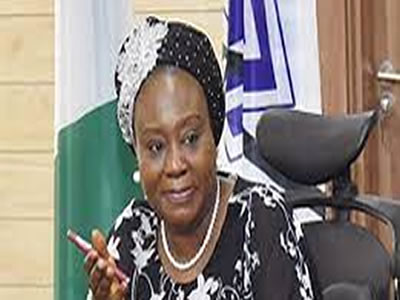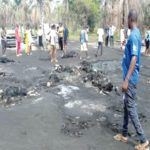THE Federal Government has expressed commitment towards ensuring that merit is emphasised in civil service in Nigeria, so as to meet the yearnings and aspirations of the people through effective service delivery.
Head of Civil Service of the Federation, Dr. Folasade Yemi-Esan, who said this, restated the need for a merit-based civil service through a seamless e-recruitment system, which will guarantee transparency, accountability, neutrality, efficiency and productivity.
Yemi-Esan spoke in Abuja while receiving an interim report of the Inter-Ministerial Committee for the Design of Appropriate Capacity Building Programmes for Directorate Level Officers in the Federal Civil Service.
She noted that the low-capacity output of officers on the Directorate cadre was an issue for concern to the Federal Government, hence the inauguration of “this all-important committee in November, 2021”, adding that “in the last two years, chairman of the Federal Civil Service Commission gives report to this office after every promotion exercise and each time he puts it on record that the capacity of Directorate Officers is fast dwindling.”
She added that the dearth of skills and competencies had made it challenging to get competent directors that would become Permanent Secretaries, “the last exercise recently conducted for the selection of Permanent Secretaries broke my heart and back completely, it was an eye opener.”
Deputy Director, Communications, Office of the Head of Service, Mr Mohammed Ahmed, in a statement, explained that the committee’s assignment was to proffer solutions for transforming the Directorate cadre workforce through the formulation of well-designed and articulated capacity building programmes aimed at bridging gap.
She added that first-class graduates and those recruited under the Presidential High Flyers’ Scheme had undergone proper training and retraining for enhanced performance, stressing that the 2023 Directorate examinations would be based on the training modules to be proposed by the committee.
Speaking earlier, chairman of the Committee and the Permanent Secretary, Ecological Funds Office, Dr. Habiba Lawal, described the constitution of the Committee as one of the best decisions taken in recent times to address the perennial challenge of low capacity within the directorate level officers.
“I strongly believe that by strengthening the directorate level, we are evidently transforming the entire workforce because they are the coaching and mentorship group for their subordinate officers and as the saying goes, you can’t give what you don’t have.”
She said that two major findings of the committee include the absence of a comprehensive service-wide policy on capacity building, which had left the service without a statutory framework on the training of officers.
“Secondly, as long as recruitment into the service is not strictly based on merit, the service will not have the best hands at entry level and as such the service would not move forward as expected,” she said.
Lawal also disclosed that a seven-man Module Review Sub-Committee headed by the Administrator, Administrative Staff College of Nigeria, (ASCON), Mrs Cecilia Gayya, has been constituted to develop training modules, which will include the preparation of training needs assessment, time, resources and technical expertise and make final submission to the main committee, after which a final report would be submitted to the HCSF.
She also disclosed that there are about 29 findings and 41 recommendations in the Interim Report, submitted, with proposed strategies, action plan and timelines for implementation.
The committee comprises 16 members; five serving Permanent Secretaries, two tretired permanent secretaries, four Directors and two Directors-General of Training Institutes and a representative of African Initiative for Governance (AIG) -Imoukhuede Foundation.
ALSO READ FROM NIGERIAN TRIBUNE
- I Already Prepared My Grave —Alaafin
- Dubai Sex Video: NAPSS Raises Concerns Over Closure Of Chrisland Schools
Adesina had told him that the Russia-Ukraine war would create global problems, and particularly for Africa, which imports a huge percentage of its food from the two countries.
“Already, the price of wheat has gone up about 60 per cent. Maize and other grains will also be affected. There may be fertiliser crisis, as there would be about 2 million metric tons deficit. And that will affect food production by about 20%. Africa will lose $11 billion worth of food, and coming shortly after COVID-19, that would be rather serious,” the AfDB President disclosed.
To prepare against the evil day, Dr Adesina said the AfDB has developed a $1.5 billion Africa Emergency Food Plan, which is now before the bank’s Board for approval.
He added: “We were not ready for COVID-19, but we are now planning to avert food crisis on the continent. There is plan to help farmers cultivate wheat, maize, rice, sorghum, and soybeans. It will mitigate the impact of the Russia-Ukraine war.”
Talking specifically of Nigeria, the Nigerian-born Adesina, and a former Minister of Agriculture, said in the wet season of 2022, at least 5 million smallholder farmers would be helped to cultivate 1 million hectares of maize, 1 million hectares of rice, and 250,000 hectares of sorghum and soybeans, respectively.
“In total, our support will help Nigeria to produce 9.5 million metric tons of food.”
States that will benefit from the assistance include Kano, Ogun, Oyo, Kaduna, Imo, Cross River, and the Federal Capital Territory.
Dr Adesina submitted: “Mr President, you have a passion for agriculture. We are behind you strongly, and we want to ensure Nigeria won’t feel the impact of the food crisis.”
How Workplace Sexual Harassment Forces Many Out Of Their Dream Jobs
Food production: We made progress shutting borders ― Buhari
Marburg Virus: What You Need To Know About Disease Recently Detected In West Africa
Food production: We made progress shutting borders ― Buhari






